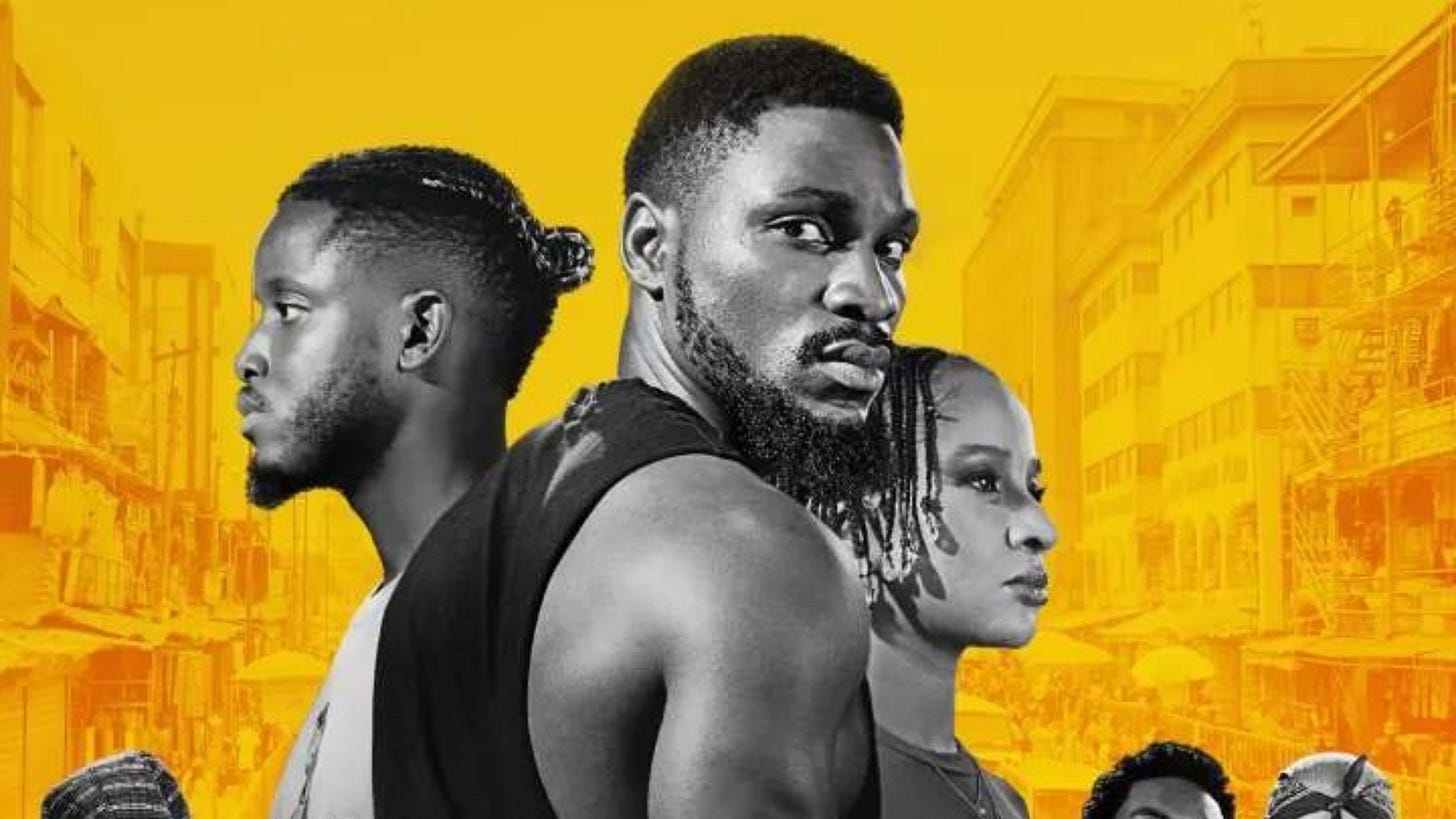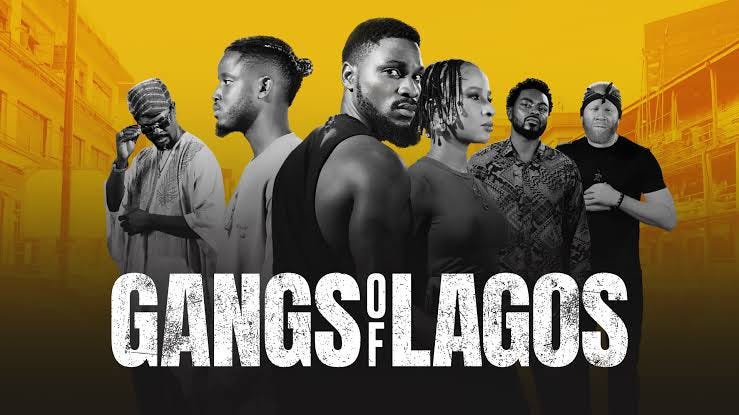Why Are A Lot Of People Hurting Because Of ‘Gangs Of Lagos’?
There's been so much chatter and faux policing all over the internet; it's been difficult hearing anything constructive amidst all the noise.
Not too long ago, I wrote about The Trade (2023) and how Jade Osiberu is actively redefining what it means to make an action thriller in today’s Nollywood. In retrospect, one thing I barely touched on was how close to home these stories she tells hit. The Trade spotlighted Eric, a rich man whose inexplicable wealth was tied directly to the ruthless kidnapping empire he ran in the covers of the dark parts of Nigeria. It doesn’t take a genius to realize that Eric's story, in many ways, fits the description of Evans the Kidnapper, a real-life figure who terrorized Nigerians in the 2010s and was notorious for many of the things portrayed in the movie.
The Trade came and went without much fanfare from the general public; my best guess is that’s because of the limited hype it received from Jade Osiberu herself (a quick look through her personal IG handle will reveal this). Understandably so. The Trade was shot a while back and is in her past, while her mega deal with Prime Video is her present and immediate future. But even with the limited number of people who have gone on to talk about The Trade, its shared DNA with the kind of stories Osiberu tells nowadays is obvious: STORIES THAT HOLD A MIRROR TO OUR SOCIETY AND FORCE IT TO re-EXAMINE ITSELF.
Enter Gangs of Lagos...
After a lengthy two-year wait since the first set of photos was released, Gangs of Lagos debuted on Prime Video on April 7 to a global audience. It tells the story of the dark side of Lagos, spotlighting three kids living in the reality of a world run by different factions of the titular gangs. When tragedy strikes, these kids find themselves further embroiled in the gang culture of Lagos, sparking one of the prevalent themes of the movie, about a person’s destiny and if it’s set in stone or can be rewritten.
It's a gritty tale that tries to prioritize the realities of the gang culture around the world and not sugarcoat things as they pertain to the city of Lagos.
Lagos has a gang problem, it's had it for the longest time. Any child born in this city within the last couple of decades can expertly narrate what a bad day in Lagos can look like when there’s a gang war. Most recently, everyone saw an episode of this kind of unrest play out during the General Elections. The memory is still as fresh as the morning dew and lumped up with the many before it. We know these things; we've lived them a thousand times and are ever cautious when moving around town lest we’re caught in the eye of the next storm, so it comes off as pretentious when people begin to make comments that border on challenging the accuracy of what was portrayed onscreen in the movie, which we know happens.
Regular people, celebrities, and people from the government alike have all been on the neck of Jade Osiberu and her team for certain creative choices made in the journey to bringing Gangs of Lagos to life.
The Lagos State Government (LASG) through its Ministry for Tourism, Arts, and Culture went as far as releasing a public statement to this effect. A paragraph in the statement signed by the Commissioner, Pharm. (Mrs.) Uzamat Akinbile-Yussuf reads:
“We are of the opinion that the production of the film ‘The Gang of Lagos’ is very unprofessional and misleading while its content is derogatory of our culture, with the intention to desecrate the revered heritage of the people of Lagos. It is an unjust profiling of a people and culture as being barbaric and nefarious. It depicts a gang of murderers rampaging across the State”.
Another such opinion piece I caught wind of came from one Dr. Eileen on LinkedIn. She described stories told by movies like Gangs of Lagos as spearheading "a dangerous trend" that is "misrepresenting Africa".
I found these and many other similar pieces scattered throughout the internet funny and borderline incredulous. I regard them as outputs from people who are either less informed about the things that go on here or, as is more common these days, choosing to stay oblivious to the realities on the ground.
The story told by GANGS OF LAGOS is as authentically Lagos as it gets.
I wonder what qualifies as an authentic (Lagos) story to Dr. Aileen, the LASG, and many of the other people who have one bone or the other to pick with the movie. What I firmly believe is that it's disingenuous to refer to Gangs of Lagos as un-African or un-Lagos because the thug life is a huge part of our reality here.
Gangs of Lagos isn't perfect. It's got holes begging to be poked at when you hold a light to it; certain parts like its casting choices and the choreography behind some of its fight scenes don’t hold up. If you drag the movie to the gallows, any of these aforementioned parts won’t hold water, but definitely not for being un-African or untrue.
The Good
The cinematography and visuals are easily the best part of this movie.
Shooting on location at Isale Eko. It must’ve been a nightmare to pull off, but the movie is made better by this push for authenticity.
The timeliness of depicting friendly main characters (Oba, Gift, and Ify) from the Igbo and Yoruba tribes of Nigeria.
Chioma Akpotha had one of the best scenes in the movie and, easily, the best monologue with the funeral scene. It was heart-wrenching, moving, and very immersive, a testament to her many years as an actress whose craft only continues to improve.
Olarotimi Fakunle's Kazeem is the standout in this movie. In the hierarchy of things, he easily takes the prize.
The story was okay. It’s a simple, generic story that doesn’t try to pull any surprises on the viewer, but it is well told, and that’s okay.
Black Camaru's Terrible "Across the River" scene was hilarious.
Calling this a true Nigerian story to the world feels more authentic than most of its contemporaries so far.
The Bad
The casting choices and how they impacted the overall acting performances
Acting performances were, generally, decent. There were some standout performances from the likes of Chioma Akpotha, Olarotimi Fakunle, and Tobi Bakre, but a case can be made about the decision to cast certain people in certain roles being linked more to their relationship to the director than how suited they are to deliver. Adesua Etomi-Wellington (Gift) and Funke Williams (Blessing).
Lack of a deeper story arc for Gift. Unlike Oba and Ify (aka Pana), we didn't get to know Gift really well. A little info on her backstory, what makes her tick, and some of her hopes for the future would've been great.
Choreography was off a little. It was much better than what we got in Shanty Town, but you could easily spot the misses, especially in some of the stunt scenes and with the implementation of foley.
The Ugly
Not really ugly, but I figured this is where it best fits in.
The irony in seeing Toyin Abraham talk about how unfair it is for one family to hold an entire state hostage was funny, seeing as her words and actions during the last Nigeria General Elections are still fresh. That didn't age well at all.
Verdict
Please go see Gangs of Lagos I you haven't. I think it's one of Nollywood’s recent good ones. It’ll most certainly end up on a lot of Nigerians’ 2023 top movies seeing as it's easily ahead of some of 2022's "bests". I also believe that with productions like this, Nollywood is headed in the right direction. I keep hope alive that we stay consistent and that more Jade Osiberus can rise to help turn the tide for good, permanently.






Welll
You have written very well but the part about the ugly which is about toyin Abraham seems a little bit personal for a reviewer to put
Remember, everyone is entitled to who so ever they want to vote for and in the movie,she only acted the role that was given to her
So from what I've studied in critical review writing, putting your personal feelings and emotions is not really appropriate